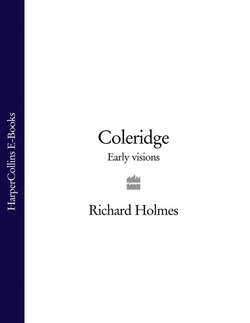Читать книгу Coleridge: Early Visions - Richard Holmes - Страница 34
FOUR PANTISOCRAT 1
ОглавлениеColeridge returned to Cambridge on 11 April 1794, travelling up on the outside of the night mail after symbolically missing the Cambridge fly. He had booked a seat, but then went for a contemplative walk, and the fly shot by him on the road. For all his brothers’ hopes, he would never again settle down at the university; his dreams were elsewhere. Outwardly he was full of good resolutions: having sat the Rustat Exam and got a credit, he would now study hard, contend “for all the Prizes”, and compile his slim volume of Imitations from the Modern Latin Poets to pay off his debts. (It was advertised in the Cambridge Intelligencer for June, but never appeared.) He would “solemnly” drop all unsuitable college friends, rise at six o’clock every morning, forswear wine parties and politics, and practise a “severe Economy”. “Every enjoyment – except of necessary comforts – I look upon as criminal.” Even in his Greek verse he would now aim at “correctness & perspicuity, not genius”. His last Ode had been so sublime that no one could understand it.1
He accepted the college’s reprimand, a month’s gating, and ninety pages of Greek translation from Demetrius Phalereus (“dry, and utterly intransferable to modern use”) with a great show of philosophy. Though his tutor, Mr Plampin, had treated him with “exceeding and most delicate kindness”, the Master, Dr Pearce, had behaved with great asperity. “All the Fellows tried to persuade the Master to greater Lenity, but in vain – without the least affectation I applaud his conduct – and think nothing of it,” he told George on 1 May. “The confinement is nothing – I have the fields and Grove of the college to walk in – and what can I wish more? What do I wish more? Nothing.”2
But of course, he now wished for everything. He played the part of the penitent prodigal with conviction, indeed he rather enjoyed it. But as Trooper Comberbache he had seen the outside world, and tasted notoriety; and guiltily he enjoyed that too. How could he return to the small existence of college honours, the remote degree (now postponed until Christmas 1795), or the narrow prospect of a clergyman’s career like dear, earnest brother George? Radical politics, Unitarian theology, poetry, newspapers, the glories of nature and science, were all fizzing in his mind. He had already attracted a following among Bob Allen’s circle in Oxford. At Cambridge, even cautious men like Caldwell treated him with respect and “almost fraternal affection”. He had become one of the wild men of his university generation, and people waited to see what he would do next. He confided to his fellow undergraduate Samuel Butler: “There are hours in which I am inclined to think very meanly of myself, but when I call to memory the number & character of those who have honoured me with their esteem, I am almost reconciled to my follies, and again listen to the whispers of self-adulation.”3 Pride and guilt mixed in him like combustible fuel, waiting to be ignited. What he wished for was an ideal cause, a grand scheme, a mighty passion. And even deeper than this, perhaps, love and friendship. It was to come initially in the shape of Pantisocracy.
